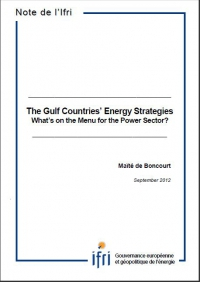Gateway to Think Tanks
| 来源类型 | Publications - Policy Papers |
| 规范类型 | 简报 |
| DOI | 978-2-36567-061-6 |
| The Gulf Countries' Energy Strategies: What's on the Menu for the Power Sector? Notes de l'Ifri, September 2012 | |
| Maïté de BONCOURT | |
| 发表日期 | 2012-09-01 |
| 出版年 | 2012 |
| 概述 | The futuristic green city of Masdar in the United Arab Emirates or the latest announcements of Saudi Arabia which might now well become the new Eldorado for solar energy companies have a clear marketing varnish. But if they are showcases of green ambitions, they nonetheless reflect the... |
| 摘要 |
The Gulf Countries' Energy Strategies: What's on the Menu for the Power Sector? Notes de l'Ifri, September 2012
The futuristic green city of Masdar in the United Arab Emirates or the latest announcements of Saudi Arabia which might now well become the new Eldorado for solar energy companies have a clear marketing varnish. But if they are showcases of green ambitions, they nonetheless reflect the situation the Gulf States face today driven by the development of heavy industry and petrochemicals but first and foremost by the rapid population growth (around 2% for Saudi Arabia and 3% for Kuwait; Qatar and the Emirates have higher population growth rate due to immigrants).  Demand for power is rising as fast as buildings, even more so as most of the water consumed is desalinated. While their economies still largely depend on oil and gas revenues, burning increasing amounts of fuels domestically into power stations is not sustainable. These countries are facing an energy paradigm with serious implications. Faced with this challenge, the Gulf States are thinking of solutions. They are moving at different speeds towards the diversification of power generation sources and the restructuration of their power sector. Recent years have therefore evolved under the banner of reform and a strong institutional activity in most states. This comparative study intends to evaluate the energy paradigm in the GCC, and the responses given by some of the monarchies. This paper is written in the middle of the reform process, and therefore does not claim to evaluate the results of these measures. Rather it looks at the speed at which these reforms are being undertaken, the tools used and advantages across the countries, and the type of reforms that are conducted. It focuses on three specific countries: Saudi Arabia, the UAE and reports on other states to a lesser extent. The final section assesses the impact of the economic crisis and the regional political turmoil on the reform process. This paper argues that while high oil prices provide a large tax base for states investments in new and alternative power generation, the fear of the contagion of political turmoil will slow the privatization process and hamper price reforms. Additionally, the global credit crunch could have a negative impact on power plants tenders.
The Gulf Countries' Energy Strategies: What's on the Menu for the Power Sector?
|
| 关键词 | energy policy Energy transition Gulf countries Saudi Arabia United Arab Emirates UAE |
| URL | https://www.ifri.org/en/publications/enotes/notes-de-lifri/gulf-countries-energy-strategies |
| 来源智库 | French Institute of International Relations (France) |
| 引用统计 | |
| 资源类型 | 智库出版物 |
| 条目标识符 | http://119.78.100.153/handle/2XGU8XDN/415660 |
| 推荐引用方式 GB/T 7714 | Maïté de BONCOURT. The Gulf Countries' Energy Strategies: What's on the Menu for the Power Sector? Notes de l'Ifri, September 2012. 2012. |
| 条目包含的文件 | ||||||
| 文件名称/大小 | 资源类型 | 版本类型 | 开放类型 | 使用许可 | ||
| mdeb2.jpg(29KB) | 智库出版物 | 限制开放 | CC BY-NC-SA |  浏览 | ||
| notedelifrigccpowerr(2037KB) | 智库出版物 | 限制开放 | CC BY-NC-SA | 浏览 | ||
除非特别说明,本系统中所有内容都受版权保护,并保留所有权利。